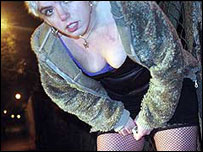
Sex workers are calling for decriminalisation of their industry
|
Women working in the sex industry around the world will debate proposed changes to the UK prostitution laws at a conference on Saturday.
The event in London is in response to the government's consultation paper on prostitution, published in July.
It launched the UK's first re-think in decades of how to deal with the issue.
But Niki Adams, of the English Collective of Prostitutes (ECP), said the document had not addressed "any of the core issues such as poverty".
In launching the consultation, Home Secretary David Blunkett said he wanted to meet head-on "the devastating consequences of prostitution".
'Two-tier system'
A 1999 survey estimated that 80,000 women in the UK were involved in the sex trade.
Prostitution itself is not illegal in the UK but most of the activities around it, such as soliciting, pimping and running a brothel, are criminal offences.
The Home Office consultation paper invited comments around a wide range of issues, including creating "managed tolerance zones", registering sex trade workers and licensing brothels.
The ECP sent in an official response and says it wants full decriminalisation of all activities surrounding sex work.
Measures such as tolerance zones and licensing have been proven not to work, according to Ms Adams.
She said: "Few women work in the licensed areas. They just set up a two-tier system. Also, to work in those areas you must register with the police and thus lose your anonymity.
"Legalisation rather than decriminalisation means you're on the game for the rest of your life."
The ECP also disputes some of the statistics in the consultation paper - such as one saying 95% of street prostitutes have a drugs problem - saying they are "selective".
"Women who work on the streets and do not use drugs rarely go to the Home Office-funded projects because they do not want to compromise their anonymity," the ECP response states.
At Saturday's conference, sex workers from around the world will share their experiences, particularly around the issues of legalisation and decriminalisation.
'Mean-spirited'
One delegate, Rachel West of US Prostitutes Collective, also believes the UK government is taking the wrong approach.
Ms West said a task force on prostitution in San Francisco, where her organisation is based, had recommended total decriminalisation rather than tolerance zones or licensing.
"This is the model the UK should be following instead of the mean-spirited and dead-end options in the report," Ms West said.
The consultation period for the Paying the Price document ended on 26 November.
A Home Office spokesman said 850 responses had been received.
They would now be collated and published next year when the government would decide on what further action, if any, to take, he added.
